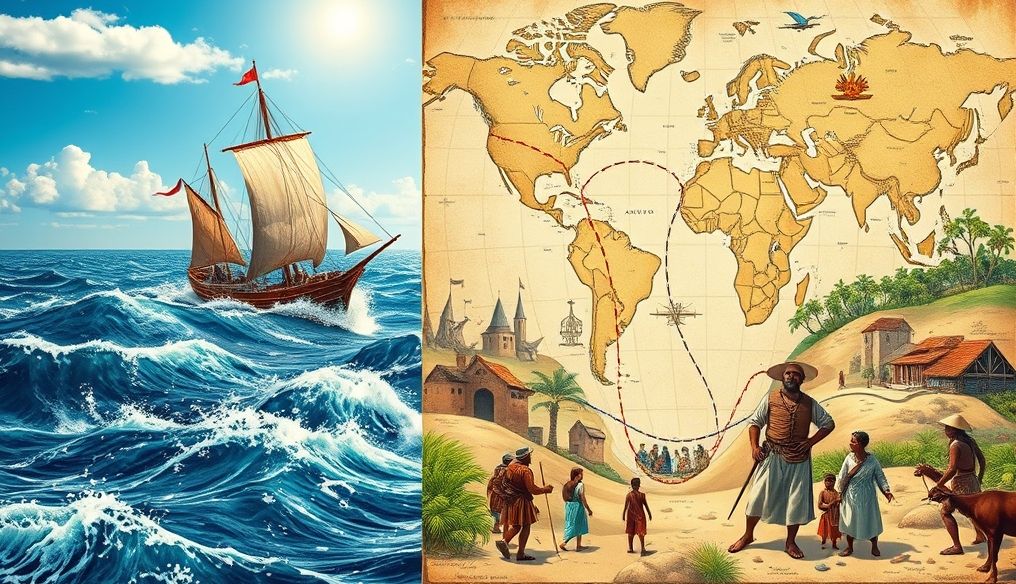Introduction: The Age of Discovery and the Transformation of the World
The Age of Discovery represents a pivotal era in human history, marked by extensive exploratory voyages across the oceans, primarily led by European nations. These voyages were not merely adventures in search of new lands, but powerful engines that led to radical transformations in economics, politics, and culture, irreversibly changing the course of history.
Motivations Behind Geographical Discoveries
Economic Incentives
The desire to control Eastern trade routes was the primary economic driver behind the discoveries. Europe depended on spices, silk, and other valuable goods from Asia, but land routes were long, expensive, and unsafe. Therefore, European countries sought to find new sea routes to reach the East, bypassing Arab and Italian intermediaries.
- Spices: Spices such as pepper, cinnamon, and cloves were highly valued in Europe, where they were used to preserve and flavor food.
- Precious Metals: The search for gold and silver was a strong motivation for exploration, especially in South America.
- Control of Trade: European countries sought to control maritime trade routes to increase their wealth and influence.
Political Factors
Competition between European countries for influence and control was an important political motivation. Each country sought to expand its empire and strengthen its power by discovering and annexing new lands.
- Competition Between Nations: Spain, Portugal, England, France, and the Netherlands competed to discover and control lands.
- Building Empires: Discovering new lands was a way to build vast empires and enhance political influence.
- Spreading Religion: Some countries saw discoveries as an opportunity to spread Christianity in new lands.
Technological Advancements
Technological advancements played a crucial role in enabling geographical discoveries. Ships, navigation, and tools were developed that allowed explorers to venture far from the coasts and explore the oceans.
| Technology | Description |
|---|---|
| Ships | Large and powerful ships such as the caravel were developed, capable of sailing long distances in the oceans. |
| Navigation | Navigation tools such as the compass and astrolabe were developed, allowing explorers to determine their position and direction at sea. |
| Maps | Maps were developed that were more accurate and detailed, helping explorers plan their voyages. |
Major Geographical Discoveries and Their Impact
Discovery of America
Christopher Columbus's discovery of America in 1492 is considered one of the most important events in human history. This discovery opened the door to European colonization of the Americas, leading to radical changes in the demographics, economy, and culture of the two continents.
"I have discovered a new land, not part of the old world we know." - Christopher Columbus
European colonization of the Americas led to:
- Extermination of Indigenous Peoples: The indigenous peoples of the Americas were subjected to extermination, enslavement, and disease, leading to a significant decline in their numbers.
- Transmission of Diseases: Europeans transmitted diseases such as smallpox and measles to the Americas, against which the indigenous peoples had no immunity, leading to widespread epidemics.
- Exploitation of Resources: Europeans exploited the natural resources of the Americas, such as gold, silver, and timber, leading to the enrichment of Europe.
- Establishment of Colonies: Europeans established colonies in the Americas, which later became independent states.
Discovery of the Cape of Good Hope Route
Vasco da Gama discovered the Cape of Good Hope route in 1498, opening a new sea route to India. This route allowed Europeans to bypass Arab and Italian intermediaries in the spice trade, leading to an increase in their wealth and influence.
The discovery of the Cape of Good Hope route led to:
- Increased Trade: Trade between Europe and Asia increased significantly, leading to the enrichment of European countries.
- Decline of Arab and Italian Influence: The influence of Arab and Italian merchants who controlled land trade routes declined.
- Establishment of Colonies: Europeans established colonies in Asia, such as India and Indonesia, to control trade.
Circumnavigation of the World
Ferdinand Magellan made the first circumnavigation of the world between 1519 and 1522, proving that the Earth is spherical. This voyage also showed the vastness of the oceans and the importance of controlling them.
Magellan's circumnavigation of the world led to:
- Proof of the Earth's Roundness: The voyage definitively proved that the Earth is spherical.
- Increased Geographical Knowledge: Increased geographical knowledge of the world, helping explorers plan their future voyages.
- Strengthening European Influence: The voyage strengthened European influence in the world, demonstrating the ability of Europeans to explore and control the oceans.
Economic Consequences of Geographical Discoveries
The Commercial Revolution
Geographical discoveries led to an unprecedented commercial revolution. Global trade increased significantly, and Europe became a center of global trade. The influx of gold and silver from the Americas into Europe led to increased wealth and the development of the banking system.
The results of the Commercial Revolution included:
- Increased Global Trade: Trade between Europe, Asia, and the Americas increased significantly.
- Development of the Banking System: The banking system in Europe developed to meet the needs of increased trade.
- Emergence of Large Trading Companies: Large trading companies such as the Dutch and English East India Companies emerged, which controlled trade with Asia.
Colonization and Exploitation
Geographical discoveries led to the colonization of large parts of the world by Europeans, especially in the Americas, Asia, and Africa. Europeans exploited the natural and human resources of these regions, leading to the enrichment of Europe and the underdevelopment of the colonies.
The results of colonization and exploitation included:
- Exploitation of Natural Resources: Europeans exploited the natural resources of the colonies, such as gold, silver, timber, and cotton.
- Slavery: Millions of Africans were enslaved and transported to the Americas to work on farms and mines.
- Economic Underdevelopment: Colonization led to the economic underdevelopment of the colonies, as they were prevented from developing their own industries.
Social and Cultural Consequences of Geographical Discoveries
Cultural Exchange
Geographical discoveries led to a wide-ranging cultural exchange between Europe and the rest of the world. Ideas, beliefs, and technologies were transferred between different cultures, leading to changes in people's way of thinking and lifestyle.
The results of cultural exchange included:
- Transfer of Ideas and Beliefs: Religious and philosophical ideas and beliefs were transferred between different cultures.
- Transfer of Technologies: Agricultural, industrial, and military technologies were transferred between different cultures.
- Spread of Languages: European languages spread in the colonies and became official languages or common languages of communication.
Demographic Shifts
Geographical discoveries led to significant demographic shifts in the world. European migration to the Americas and other parts of the world led to changes in the demographics of these regions. The transportation of Africans to the Americas also changed the demographics of the two continents.
The results of demographic shifts included:
- European Migration: Millions of Europeans migrated to the Americas and other parts of the world, leading to changes in the demographics of these regions.
- Transportation of Africans: Millions of Africans were transported to the Americas to work on farms and mines, leading to changes in the demographics of the two continents.
- Racial Changes: Migration and slavery led to changes in the racial composition of societies around the world.
Political Consequences of Geographical Discoveries
Rise of European Powers
Geographical discoveries led to the rise of European countries as global powers. European countries controlled maritime trade routes and established vast empires around the world, leading to an increase in their wealth and influence.
The results of the rise of European powers included:
- Control of Trade Routes: European countries controlled maritime trade routes, leading to an increase in their wealth and influence.
- Establishment of Empires: European countries established vast empires around the world, leading to an increase in their political and military influence.
- Colonial Wars: European countries fought colonial wars to control lands and resources around the world.
Decline of Other Powers
Geographical discoveries led to the decline of other powers, such as Arab, Italian, and Chinese countries. These countries lost control of maritime trade routes, and their wealth and influence declined.
The results of the decline of other powers included:
- Loss of Control of Trade: Arab, Italian, and Chinese countries lost control of maritime trade routes, leading to a decline in their wealth and influence.
- Political and Military Weakness: Economic decline led to political and military weakness, making these countries vulnerable to invasion and colonization.
Conclusion: The Legacy of Geographical Discoveries
Geographical discoveries have left a profound legacy on the world. These discoveries irreversibly changed the course of history and led to radical transformations in economics, politics, and culture. The effects of geographical discoveries are still felt today, in international relations, global trade, and cultural diversity.




